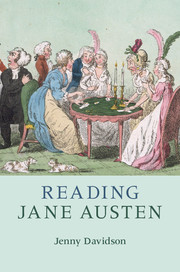Austen Criticism
Butler, Marilyn, Jane Austen and the War of Ideas (Oxford: Clarendon, 1975).
Chwe, Michael Suk-Young, Jane Austen: Game Theorist (Princeton, NJ, and Oxford: Princeton University Press, 2013).
Davidson, Jenny, Hypocrisy and the Politics of Politeness: Manners and Morals from Locke to Austen (Cambridge: Cambridge University Press, 2004).
Davidson, Jenny, “Jane Austen and the Conditions of Knowledge,” in A Companion to British Literature: Volume III: Long Eighteenth-Century Literature 1660–1837, ed. DeMaria, Robert Jr., Chang, Heesok and Zucker, Samantha (Chichester: John Wiley & Sons, Ltd., 2014), 298–311.
Johnson, Claudia L., Jane Austen: Women, Politics and the Novel (Chicago and London: University of Chicago Press, 1988).
Miller, D. A., Jane Austen, or The Secret of Style (Princeton, NJ: Princeton University Press, 2003), 40–41.
Rawson, Claude, “Satire, Sensibility and Innovation in Jane Austen: Persuasion and the Minor Works,” in Satire and Sentiment, 1660–1830: Stress Points in the Augustan Tradition (New Haven, CT, and London: Yale University Press, 1994), 267–98.
Sabor, Peter, “Jane Austen: Satirical Historian,” in Swift’s Travels: Eighteenth-Century British Satire and Its Legacy, ed. Hudson, Nicholas and Santesso, Aaron (Cambridge: Cambridge University Press, 2008), 217–32.
Sabor, Peter, “Refashioning The History of England: Jane Austen and 1066 and All That,” in The Afterlives of Eighteenth-Century Fiction, ed. Cook, Daniel and Seager, Nicholas (Cambridge: Cambridge University Press, 2015), 273–89.
Said, Edward W., Culture and Imperialism (New York: Knopf, 1993).
Spacks, Patricia Meyer, Gossip (New York: Knopf, 1985).
Tanner, Tony, Jane Austen (Basingstoke: Macmillan, 1986).
Trilling, Lionel, “The Sentiment of Being and the Sentiments of Art,” in Sincerity and Authenticity (Cambridge, MA: Harvard University Press, 1972), 53–80.



